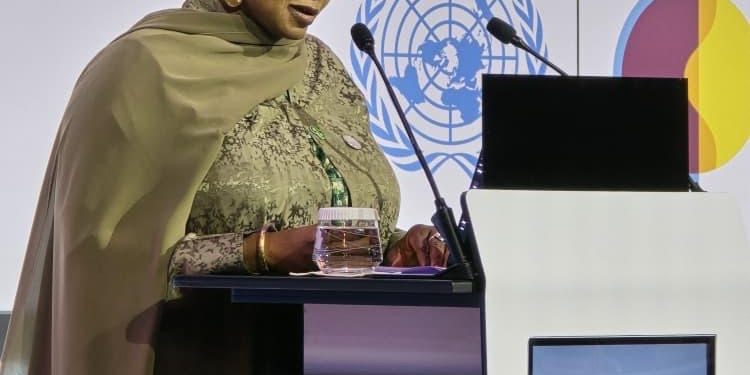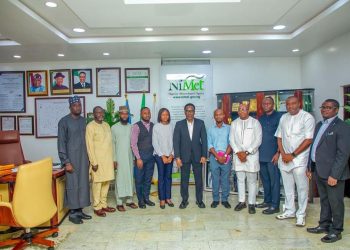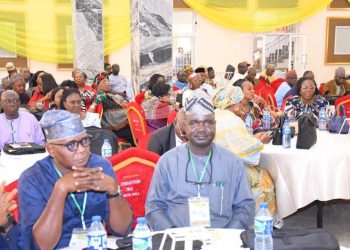…as Minister Imaan reaffirms commitment to inclusive growth, women’s empowerment, and digital equity
By Nkechi Eze
Nigeria has once again demonstrated its leadership in advancing inclusive social development and people-centred governance on the global stage, unveiling a bold social transformation blueprint at the Second World Summit for Social Development (WSSD) held in Doha, Qatar.
Delivering Nigeria’s country statement on behalf of President Bola Ahmed Tinubu, the Honourable Minister of Women Affairs and Social Development, Hon. Imaan Sulaiman-Ibrahim, reaffirmed that the nation’s ongoing reforms are designed to expand opportunity, strengthen cohesion, and ensure that no citizen is left behind in the pursuit of national prosperity.
According to a statement by her Special Adviser on Media and Publicity, Mr. Jonathan Eze, the Minister declared that Nigeria’s social policy framework is rooted in the Nigeria Agenda 2050 and fully aligned with the Renewed Hope Agenda, which prioritizes people-centred governance, poverty eradication, human capital development, and inclusive growth.
“Nigeria fully aligns with the statement delivered on behalf of the African Group. Our vision for social development is guided by the Nigeria Agenda 2050 and anchored on the priorities of the Renewed Hope Agenda, focusing on people-centered governance, poverty eradication, human capital development, and inclusive growth,” she said.
Outlining key national reforms, Sulaiman-Ibrahim highlighted the creation of Regional Development Ministries and Agencies across the six geopolitical zones to drive balanced territorial development and foster inclusive participation in national growth. She also pointed to the Ward Development Initiative, which aims to ensure that development touches every community in the federation, no matter how remote.
Among the flagship programmes, the Minister announced the institutionalization of the National Social Investment Programmes (NSIP) through a dedicated agency, a move that guarantees sustainability and transparency. Through this mechanism, millions of Nigerians have continued to benefit from conditional cash transfers, youth employment schemes, school feeding programmes, and enterprise support projects, all designed to “trigger multidimensional prosperity anchored on a National Social Register.”
Describing digital transformation as a cornerstone of Nigeria’s social renewal, Sulaiman-Ibrahim disclosed that the government has launched an enhanced National Digital Identity Portal to promote governance efficiency, transparency, and social inclusion. The initiative, she explained, facilitates access to public services, simplifies mobility, and enables targeted delivery of social protection benefits to those who need them most.
The Minister also emphasized youth empowerment as a central pillar of the Tinubu administration’s development vision. She noted that through the Nigeria Youth Investment Fund (NYIF) and the Creative Economy Development Fund (CEDF), the government is unlocking innovation, expanding entrepreneurial opportunities, and investing in the future of young Nigerians particularly women, while scaling up Technical and Vocational Education and Training (TVET) and STEM education nationwide.
Expanding on Nigeria’s holistic approach to human development, Sulaiman-Ibrahim said the government has adopted a lifespan approach to social development. This includes the introduction of Universal Child Grants, the establishment of a National Council for Social Work, and the implementation of the Discrimination Against Persons with Disabilities (Prohibition) Act, 2018 through the National Commission for Persons with Disabilities (NCPWD).
Under the ambitious Renewed Hope Social Impact Intervention 774 (RH-SII774), the Minister revealed that the government targets to empower over 10 million women within five years, strengthen family systems, and institutionalize care structures through comprehensive social workforce reforms.
She added that Nigeria is also intensifying investments in primary healthcare, maternal and child welfare, early childhood education, and clean energy access, while deepening its commitment to climate action and environmental sustainability.
“In Nigeria, inclusive social development is not an aspiration but an obligation,” the Minister declared, stressing that social progress requires shared responsibility, political will, and global cooperation.
Reaffirming Nigeria’s commitment to the Doha Political Declaration and the 2030 Agenda for Sustainable Development, Sulaiman-Ibrahim called for stronger international solidarity to ensure that “every woman, every child, and every family thrives in dignity.”
She concluded her address with a powerful appeal for the global community to reimagine progress beyond the boundaries of economic growth. “We must measure our success not merely by GDP figures, but by human resilience, gender equality, and collective well-being,” she said.
The Minister’s presentation drew commendation from participants for its comprehensive vision and policy coherence, positioning Nigeria as a model for inclusive governance, gender empowerment, and digital social transformation in Africa and beyond.
















